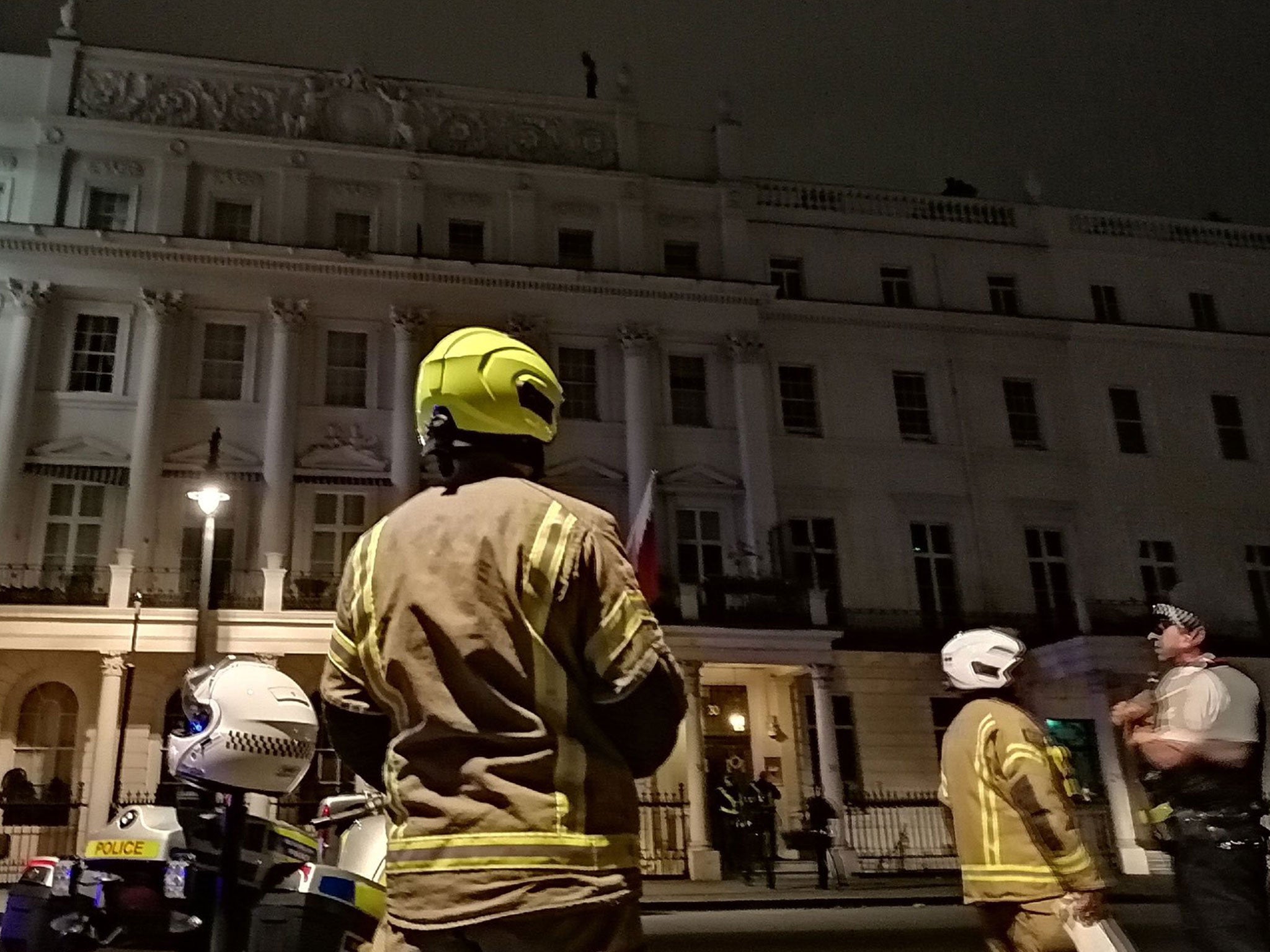Police investigating claim Bahrain embassy staff tried to kill protester on roof
Embassy dismisses ‘ridiculous’ allegations after police storm diplomatic building during protest
Police are assessing allegations that staff at the Bahrain embassy in London attempted to kill a protester.
Moosa Mohammed claims men attempted to push him from the diplomatic building’s rooftop after he scaled it to demonstrate against executions in the Gulf state.
Police facilitated the protest on 26 July, as he unfurled a banner and chanted before panic broke out when a second figure was seen on the roof.
Footage of the incident appeared to show Mr Mohammed apparently struck by a wooden pole or stick as he sat on a ledge, several storeys above Belgrave Square in London.
Officers used a megaphone to order embassy staff back inside the building, but broke down the door and stormed inside after he disappeared from view and was heard shouting for help.
In a complaint lodged with the Metropolitan Police on Tuesday, Mr Mohammed alleged that embassy staff had attempted to push him off the roof as one threatened: “We have two people being executed in Bahrain and you will be the third.”
The protester claimed he was dragged out of sight on the roof, where a wet T-shirt was used to cover his mouth and the men attempted to tie his hands behind his back.
A statement to police said the assault only stopped after officers broke into the embassy and made their way to the rooftop.
“I thought I was going to die,” Mr Mohammed said. “I was pushed, beaten and tortured. I believe they tried to kill me that night. If the police had not broken into the Embassy and found me, I believe I would have been killed.”
Comparing the incident to the murder of journalist Jamal Khashoggi by Bahrain’s ally Saudi Arabia, he added: “We don’t expect abuses in the UK to happen without impunity as they do in Bahrain.”
Mr Mohammed was arrested for trespass on a diplomatic premises at the scene of the incident and remains on bail.
A spokesperson for the Metropolitan Police said: “On Tuesday 19 November, officers received an allegation in relation to an incident at the embassy of the Kingdom of Bahrain on 26 July.
“The allegation is currently being assessed. There have been no arrests.”
A spokesperson for the embassy dismissed the allegations as “ridiculous” and said the incident was handled with restraint and in full cooperation with British authorities.
“Embassy staff were acting to prevent the intruder from inflicting serious harm to himself, while also attempting to proportionately preserve the security of private property,” the spokesperson said.

“The allegation that embassy staff were trying to ‘kill’ Mr Mohammed is completely unfounded and ridiculous.”
The embassy said staff had called police immediately when alerted to an intruder on the roof and had previously liaised with Scotland Yard over the planned protest.
Sayed Ahmed Alwadaei, director of campaign group the Bahrain Institute for Rights and Democracy, said he heard Mr Mohammed “screaming for help” from the ground during the incident.
“We should know the truth about what happened and those who attacked Moosa must be held to account,” he added. “The British government’s strong relationship with the Bahraini authorities should not prevent justice being served.”
Lawyers representing Mr Mohammed called for a “robust investigation” and for the Foreign and Commonwealth Office to cooperate.
Emily-Jade Defriend, of Bindmans, said: “These are extremely serious allegations. That the alleged offences took place in the Bahraini embassy does not put them beyond the scrutiny of the British police.”
At a previous protest in the embassy in January 2017, staff were accused of throwing hot water from a balcony onto demonstrators sitting below.
Diplomatic immunity is granted to all embassy staff and their families under international conventions, but the level of protection is dependent on rank and only covers employees notified to the FCO.
Crown Prosecution Service guidance states: “Criminal immunity is only afforded to the service staff at foreign diplomatic or foreign London-based consular missions in respect of the acts performed in the course of their duties. However, such staff are not inviolable.”
Mr Mohammed was demonstrating against the execution of two men who had allegedly been subjected to torture in Bahraini custody.
Authorities accused them of links to a terrorist group but United Nations experts and human rights organisations had called for a halt to the executions.
Bahrain has been accused of human rights abuses against protesters and dissidents since a failed uprising that started during the 2011 Arab Spring.
It crushed protests, where the Shia Muslim majority were demanding greater rights from the Sunni-led monarchy, with the help of Saudi Arabia and the United Arab Emirates.
Bahraini authorities have detained critics, dissolved a major Shia opposition bloc and shut down an independent newspaper, forcing many Bahrainis into exile and stripping others of their nationality.
Bookmark popover
Removed from bookmarks